
Antisemitism has long been the most-reported religious hate crime. Since the October 7th Israeli massacre by Hamas it has skyrocketed, with downtowns, college campuses and other areas being site to some of the most blatant and overt acts of our time, creating a fear of another Holocaust to come.
In October, the FBI released its 2022 Hate Crimes Statistics Report, which showed more than half of all religion-based crimes in the U.S. are anti-Jewish. Additionally for 2022, the Anti-Defamation League (ADL) tabulated a 36% increase in antisemitic acts over what it had found in 2021, which at that point was the highest number recorded since the organization began tracking incidents in 1979. After California, New Jersey had the most reported antisemitic incidents across the U.S. in 2019, the most in 2020 & 2021 and the 2nd most in 2022. Since the October 7th attacks, the spike has been monumental, surpassing all reports in recent decades.
“This is the most heightened antisemitism, unprecedented in our lifetimes,” states Brandi Katz Rubin, ADL Senior Associate Regional Director for NY/NJ. “We’re seeing Jew hate, not just anti-Israel hate at this point, which has shifted in the past weeks. Protests or vandalism is not just death to Israel but death to Jews, it’s F&%* Jews. At Rutgers University, someone recently posted on the school’s YikYak channel a murderous threat to an Israeli fraternity member. Police were able to track them down and there was an arrest.”
WHAT EXACTLY IS ANTISEMITISM?
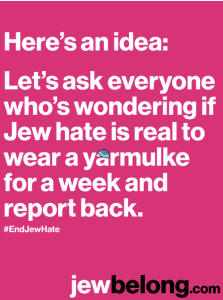 The working definition of antisemitism from the International Holocaust Remembrance Alliance, widely accepted internationally, is “a certain perception of Jews, which may be expressed as hatred toward Jews. Rhetorical and physical manifestations of antisemitism are directed toward Jewish or non-Jewish individuals and/or their property, toward Jewish community institutions and religious facilities.”
The working definition of antisemitism from the International Holocaust Remembrance Alliance, widely accepted internationally, is “a certain perception of Jews, which may be expressed as hatred toward Jews. Rhetorical and physical manifestations of antisemitism are directed toward Jewish or non-Jewish individuals and/or their property, toward Jewish community institutions and religious facilities.”
At just 2% of the U.S. population, Jews have become an increased target in the United States. From Oct. 7th– Nov. 7th there were 832 incidents of assault, vandalism and harassment that have been vetted and confirmed by the ADL, a 316% increase as compared to this period last year (when there was already heightened antisemitism due to comments made by Ye). Over the weekend, a grenade (later found to be inert) was spotted at Holocaust Memorial Park in Brooklyn, and what turned out to be a phony 9-1-1 call claiming pipe bombs were left inside one of New York City’s biggest synagogues had many on edge. New York and New Jersey officials are on alert.
“The New Jersey Attorney General has spoken very strongly, and Governor Murphy has spoken very strongly and unequivocally in support of Israel’s right to defend itself and condemning terrorism,” Rubin states. They have also spoken out against hate and antisemitism. And while that helps, she says other things are fueling the fire. “Reporting on unverified information in the media we are seeing has real consequences in the real world. It is leading to antisemitic hatred and violence.”
LOCAL INCIDENTS REPORTED
Anti-Jewish crimes in New York City have tripled since Oct. 7th. Overall, in the NY/NJ region, as of Nov. 1st there was more than a 100% increase in incidents reported to the ADL compared to this time last year, a number that is expected to have grown even larger by now. For 2023, the ADL heatmap (which has not been updated with all recent reports) shows antisemitic acts and white supremacist events have been reported nearby in Princeton, Hamilton, Plainsboro, Ewing and New Brunswick. An additional map from the ADL shows East Windsor was the site of recent antisemitic harassment as well. Princeton Police Department says there has not been anything of this nature filed directly to them recently. Reported means that someone either filed a police report or submitted the details to the ADL directly, incidents which are then vetted. Many acts of Jew hatred are not even reported, do not rise to the level of a crime or do not qualify as a registered incident. Therefore, the numbers are said to be only a portion of what is taking place.
Though not a rampant hotbed, Princeton has had its share of strong antisemitic acts over the years. For example, in 2016, Princeton High School students were found to be playing “Jews vs. Nazis” beer pong. In 2017, a swastika was put into a document shared across all 8th graders and staff at the Princeton Middle School. 2021 saw a Pro-Palestinian rally turn into a march down Nassau Street with people holding signs that included words like “Hitler Should Have Finished the Job.” And earlier this year, a Princeton Middle School student shouted plans to shoot up a Bar Mitzvah, in addition a white supremacist group marched through town. Antisemitic acts are sometimes very intentional and other times done out of a lack of understanding. A new study, released this week by the ADL, finds that 71% of Americans feel Jew-hatred is a major problem in the U.S. American Jewish Committee (AJC) did a survey last year and found 31% of Americans were not even familiar with the term antisemitism.
“It is a hatred of Jews and a hatred of Zionism, I believe they go hand in hand. The expressions thereof, in word and deed, in ways that are either aggressive or passive. There are subtle forms of antisemitism that usually come out in someone’s language that they use,” notes Rabbi Andi Merow, of The Jewish Center. “The quiet words, antisemitic comments, contribute to people feeling not safe and othered, meaning your group is not mainstream and there’s something wrong with you.”
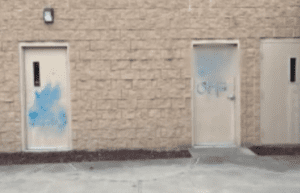 Locally, there has been some escalation this past month, but it doesn’t appear to be as heightened as seen elsewhere. On Route 18, near the Rutgers campus, a mix of Nazi ideology and Israeli hatred was drawn on the ground – a Nazi flag with a swastika in the middle coupled with graffiti that said F&%* Israel and death to the IDF. A local synagogue in Monroe was spraypainted with antisemitic graffiti last week. Local high school students have also seen an uptick in hurtful and harmful comments and actions. One area student was repeatedly asked by another what their number was, while the student rolled up their sleeve and pointed to the forearm – a reference to the numbers branded into the arms of those at concentration camps during the Holocaust. Another local student has had “dog whistle” shouted repeatedly, a term that appears to mean nothing but in fact is a way to communicate a noxious view some recognize without outright saying it for all to hear.
Locally, there has been some escalation this past month, but it doesn’t appear to be as heightened as seen elsewhere. On Route 18, near the Rutgers campus, a mix of Nazi ideology and Israeli hatred was drawn on the ground – a Nazi flag with a swastika in the middle coupled with graffiti that said F&%* Israel and death to the IDF. A local synagogue in Monroe was spraypainted with antisemitic graffiti last week. Local high school students have also seen an uptick in hurtful and harmful comments and actions. One area student was repeatedly asked by another what their number was, while the student rolled up their sleeve and pointed to the forearm – a reference to the numbers branded into the arms of those at concentration camps during the Holocaust. Another local student has had “dog whistle” shouted repeatedly, a term that appears to mean nothing but in fact is a way to communicate a noxious view some recognize without outright saying it for all to hear.
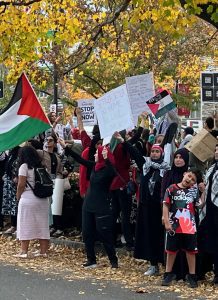 On October 28th and November 4th, Pro-Palestinian rallies were held along areas of Nassau Street in Princeton. The rallies themselves were not considered antisemitic. However, when antisemitic terms or tropes were displayed on signs or shouted from the crowd, messages of Jew hatred were spread. AJC has recently explained “when protesters chant ‘From the River to the Sea,’ they are rejecting Israel’s right to exist, by indicating that the entire land of Israel should be freed from Jews.” The ADL also considers this chant to be antisemitic, stating on its website “it is fundamentally a call for a Palestinian state extending from the Jordan River to the Mediterranean Sea, territory that includes the State of Israel, which would mean the dismantling of the Jewish state. It is an antisemitic charge denying the Jewish right to self-determination, including through the removal of Jews from their ancestral homeland.” Additionally, signs supporting the Hamas attack and people screaming directly at locals that they have “blood on their hands” caused concern and fear to some witnessing the rally.
On October 28th and November 4th, Pro-Palestinian rallies were held along areas of Nassau Street in Princeton. The rallies themselves were not considered antisemitic. However, when antisemitic terms or tropes were displayed on signs or shouted from the crowd, messages of Jew hatred were spread. AJC has recently explained “when protesters chant ‘From the River to the Sea,’ they are rejecting Israel’s right to exist, by indicating that the entire land of Israel should be freed from Jews.” The ADL also considers this chant to be antisemitic, stating on its website “it is fundamentally a call for a Palestinian state extending from the Jordan River to the Mediterranean Sea, territory that includes the State of Israel, which would mean the dismantling of the Jewish state. It is an antisemitic charge denying the Jewish right to self-determination, including through the removal of Jews from their ancestral homeland.” Additionally, signs supporting the Hamas attack and people screaming directly at locals that they have “blood on their hands” caused concern and fear to some witnessing the rally.
COLLEGES FACING THE FIGHT NEARBY
Similar chants and signage have also been seen over the past month across the campus of Princeton University (PU), one of many institutions of higher education that has been noted in national media for antisemitic incidents on campus. Rutgers University has also been the site of several targeted and covert attacks. Since Oct. 7th, at least 200 of the 653 anti-Israel rallies held nationwide have included support for Hamas and/or violence against Jews in Israel – 124 of those took place on college campuses. Concerned about threats and danger to the students, staff and faculty on these campuses, on November 2nd the U.S. House of Representatives overwhelmingly passed a resolution “condemning the support of Hamas, Hezbollah, and other terrorist organizations at institutions of higher education, which may lead to the creation of a hostile environment for Jewish students, faculty, and staff.” Congresswoman Bonnie Watson Coleman, who represents Princeton, voted against this bill.
PU has faced heat in the past, including at the start of this school year for a book on a course reading list strongly criticized as antisemitic, and officials recognize things have gotten even more heated this past month.
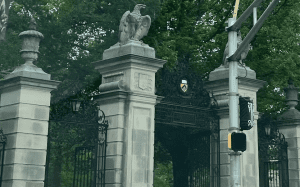 “The University takes antisemitism and other forms of bias seriously. As on many campuses, Princeton has seen a heightened number of concerning incidents, interpersonal conflicts, and demonstrations since October 7. The University is working to respond to these painful, problematic situations and support the wellbeing of the campus community while maintaining the right of individuals to engage in protected speech,” shares Michael Hotchkiss, Princeton University Assistant VP for Communications. He further spoke of the issue many are discussing, which is where the line is drawn between free speech and hate speech. A recent PU walkout organized by Students for Justice in Palestine (SJP), a group with chapters on over 200 campuses that has explicitly expressed support for Hamas or terrorism, included chants of “Long live the Intifada (a reference to the days of suicide bombers and mass shootings on the streets of Israel). “As President Eisgruber has written, ‘The freedom of speech allows not only for genteel conversation but also for harsh language, impassioned argument, and provocative rhetoric. Of course, it also permits all of us to criticize statements that we find offensive or irresponsible, even if that speech is fully protected from punishment or discipline.’”
“The University takes antisemitism and other forms of bias seriously. As on many campuses, Princeton has seen a heightened number of concerning incidents, interpersonal conflicts, and demonstrations since October 7. The University is working to respond to these painful, problematic situations and support the wellbeing of the campus community while maintaining the right of individuals to engage in protected speech,” shares Michael Hotchkiss, Princeton University Assistant VP for Communications. He further spoke of the issue many are discussing, which is where the line is drawn between free speech and hate speech. A recent PU walkout organized by Students for Justice in Palestine (SJP), a group with chapters on over 200 campuses that has explicitly expressed support for Hamas or terrorism, included chants of “Long live the Intifada (a reference to the days of suicide bombers and mass shootings on the streets of Israel). “As President Eisgruber has written, ‘The freedom of speech allows not only for genteel conversation but also for harsh language, impassioned argument, and provocative rhetoric. Of course, it also permits all of us to criticize statements that we find offensive or irresponsible, even if that speech is fully protected from punishment or discipline.’”
Around the country, many Jewish students are reporting they do not feel safe amidst the changing climates on college campuses. Despite what is happening at PU, the Rabbi for the on-campus Jewish organization, Hillel, says the students are getting through this.
“There have, indeed, been pro-Palestinian events on Campus, and at one event, participants chanted ‘From the River to the Sea’ and ‘Intifada’. Many in the Jewish community hear these chants not as a call for peaceful Palestinian resistance to oppression or support for a Palestinian state, but as an antisemitic wish for the obliteration of the Jewish State, and as a call to violence and worse against Jews,” explains Rabbi Gil Steinlauf, Executive Director and Jewish Chaplain Center for Jewish Life – Princeton Hillel. “In the face of these challenges, however, our Jewish students are, across the board, undaunted and unafraid on campus. They are surrounded by love and support not just at the Center for Jewish Life, Princeton Hillel, but by so many among their non-Jewish peers and in the university leadership who have expressed their care, compassion, and support for the Jewish people on campus. Our students walk around campus proudly as Jews, and many are more than willing to engage their peers in talking about Israel, and to help them to understand the complexities of the situation, many of which are lost in the news reports and in social media these days.”
COMMUNITIES COMING TOGETHER
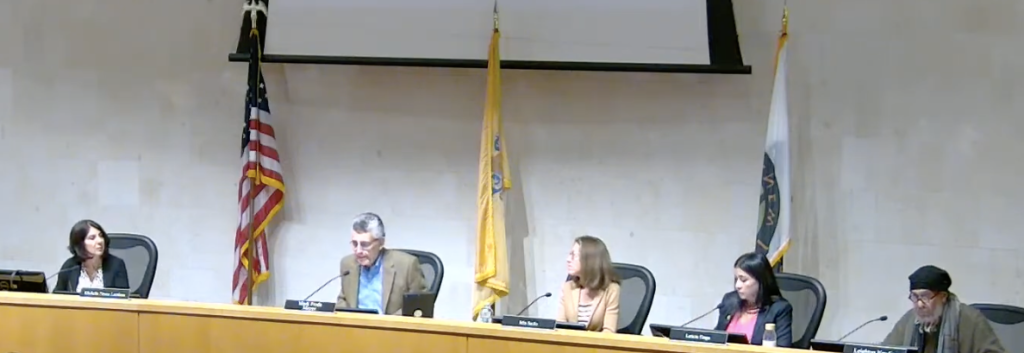 There is also a sense of comfort and safety for other Jews in the community when people speak out against hate. In a statement at their October 23rd meeting, Princeton Council and Mayor made a statement about the Israel-Hamas war which included “we reaffirm our unwavering commitment to stand against antisemitism…” This statement was not made in a vacuum, according to Rabbi Merow, who says the mayor’s office, the Princeton Police department, local Presbyterian pastors and local Black ministers have reached out. Two other local ministers joined The Jewish Center congregation for services this past weekend.
There is also a sense of comfort and safety for other Jews in the community when people speak out against hate. In a statement at their October 23rd meeting, Princeton Council and Mayor made a statement about the Israel-Hamas war which included “we reaffirm our unwavering commitment to stand against antisemitism…” This statement was not made in a vacuum, according to Rabbi Merow, who says the mayor’s office, the Princeton Police department, local Presbyterian pastors and local Black ministers have reached out. Two other local ministers joined The Jewish Center congregation for services this past weekend.
“The antidote of antisemitism is the love and care the Jewish community has received from the police dept and the mayor’s office. I have felt they have gone out of their way to try and support us,” Merow shares.
By standing up to hate, you too, can show your support. If you have been the victim of or witnessed an antisemitic incident, you can report it through the ADL Incident Portal at adl.org/report. They should also be reported to the Princeton Police Department.

Lisa Jacknow spent years working in national and local news in and around New York City before moving to Princeton. Working as both a TV producer and news reporter, Lisa came to this area to focus on the local news of Mercer County at WZBN-TV. In recent years, she got immersed in the Princeton community by serving leadership roles at local schools in addition to volunteering for other local non-profits. In her free time, Lisa loves to spend time with her family, play tennis, sing and play the piano. A graduate of the S. I. Newhouse School of Public Communications at Syracuse University, Lisa was raised just north of Boston, Massachusetts but has lived in the tri-state area since college. She is excited to be Editor and head writer for Princeton Perspectives!
